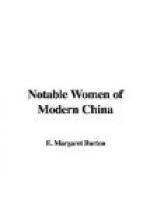“There should be no ironclad rules, however; each case must be counted on its own merits. Generally speaking, it might be well for the physician in charge to state plainly that the very poor are to be treated free of charge and have medicines, and occasionally food supplies, gratis. Those a little better off may help a little in paying for the medicines. The next step above that is to pay partly for the treatment as well; while the highest grade is to pay in proportion to the amount of help received. All this means a good deal of thought on the part of the physician and assistant, but gradually it will become routine work and so demand less labour.”
“Is self-supporting work a missionary work? Assuredly yes; for is not the money thus gained used in giving relief to the poor?... And if all money received goes again into the work, to increase its efficiency, why may it not be counted missionary? Part of it is given as thank-offering by those who are not Christian, and all is given for value received from Christian effort. Our Lord healed diseases without money and without price. If we ask, ’What would Jesus do?’ under our existing circumstances, the suggestion comes to my mind that it would be something different in form, but not in principle, from what He did in a different land, under far different circumstances, nineteen hundred and more years ago. Someone says we are to follow Jesus, not to copy Him; and the principal thing, it seems to me, would be always to abide in the Spirit of the Christ, by whatever method we feel constrained to render our little service.”
Although the new step was taken so bravely, it was not an easy one. Some idea of the courage it required is shown by the doctor’s report of her first year in Nanchang; “The very thought of making a report causes many poignant memories to rush upon us. With what hesitancy and timidity did we begin our work in the new field! Knowing our own limitations, it was not with a light heart that we began the new year. Yet,” she was able to add, “as we toiled on, we could but acknowledge that we were wonderfully led along ‘The Pathway of Faith.’”
Enough money was contributed by the Nanchang people to enable Dr. Kahn to rent a house in the centre of the city, in which dispensary work could be carried on, and in which she lived. They also supplied her with a small stock of drugs with which to begin work, and she treated something over two thousand patients during the first eight months. The number seemed small after the work to which she had been accustomed in Kiukiang; but she was becoming known in the city, and in addition to her patients several of the women of the city had called on her in a purely social way, many of them educated women of the official class. Dr. Kahn says of them:




